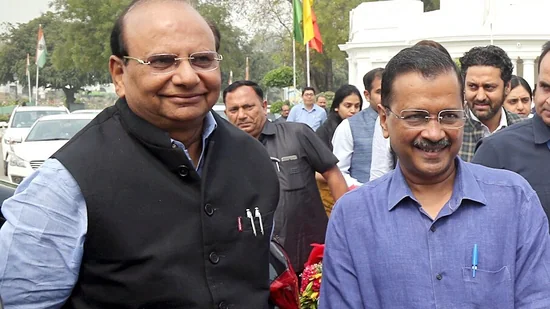In a landmark judgment on Thursday, the Supreme Court delivered a unanimous ruling in favor of the elected government, stating that it will have authority over all services in Delhi, except for law and order and land. The court emphasized that the Lieutenant Governor (LG) would exercise powers under the administrative role as entrusted by the President. The executive administration’s jurisdiction would be limited to matters falling outside the purview of the legislative assembly, and the powers would be restricted to those entrusted by the President. The court underscored that granting complete administrative control to the LG would render the purpose of having a separate elected body in Delhi futile.
The Supreme Court asserted that it is ideal for a democratically elected government to have control over its officers and hold them accountable. The court highlighted that if officers are not responsive to the government, the collective responsibility is diluted, and a sense of unaccountability prevails. The Chief Justice of India (CJI) expressed that the interests of the legislature and the public would be diluted if a democratically elected government is not allowed to control its officers and hold them accountable.
The Constitution Bench explicitly disagreed with Justice Ashok Bhushan’s split judgment in 2019 regarding the power dynamics over Delhi’s services between the Delhi government and the Centre. As the CJI read the verdict, he emphasized that the principle of democracy is an integral part of the basic structure of federalism. It ensures the survival of diverse interests and accommodates diverse needs. Since the Delhi government is elected by the people, its powers must be interpreted to further the cause of representative democracy, the CJI added.
The court highlighted that Article 239A(3)(A)(a) does not provide multiple safeguards to protect the interests of the Union Government. It stipulates that the Delhi legislature has no power to deal with entries 1, 2, and 8 of list 2, which encompass public order, police, and land. Article 239AA, on the other hand, specifies that the legislative power of the Delhi government is excluded concerning the aforementioned lists. The legislative structure aims to exclude only specific entries from the power of the legislative assembly of the Government of the National Capital Territory of Delhi (GNCTD), the Chief Justice of India explained.
The CJI emphasized that the Delhi assembly is bestowed with the power to legislate and represent the will of the people. The principles of democracy and federalism are fundamental to the basic structure of the Constitution. Federalism facilitates the survival of diverse interests and caters to diverse needs, the CJI added.
This ruling concludes a long-standing dispute over the control of Delhi’s bureaucracy between the Lieutenant Governor and the elected government. The Supreme Court had referred the matter to a five-judge bench in May 2022, clarifying that the bench would solely adjudicate the issue concerning “services” in Delhi and not delve into other substantial issues regarding the interpretation of Article 239AA, which delineates the legislative and executive powers of the Delhi government and designates land, police, and public order as the exclusive domain of the Centre in the capital.
Send a message.
Free Research Preview. ChatGPT may produce inaccurat


